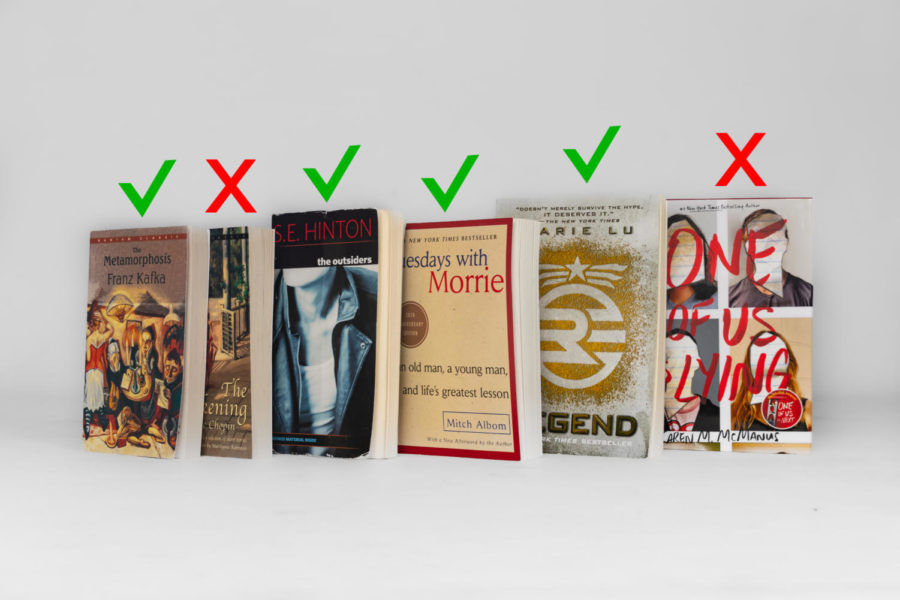Obligatory books
Senior ranks required English class readings
Photo by Braylen Garren
A variety of books common in secondary English curriculums stand in a row. Many assigned readings are notoriously boring, but others catch students’ attention.
January 31, 2022
The sound of wind swooshing around paper as each page is flipped from cover to cover. The grainy texture of a lightly torn paperback that’s been sitting in the back of the library shelf for years. The rapidly blinking of your eyes as dust collected on a cover flies into the air upon picking it up.
Reading should be an enticing, page-turning adventure, but because of the sickening book selection English teachers force upon us, literature often feels like a chore for high schoolers. No one wants to read these 5,000 page books where nothing happens. It feels like you need a dictionary at all times to understand anything characters are saying in some books. However, there are a couple choices from the English department that can be an interesting read. Here are the best and worst of the books schools have decided we must know before graduation.
“The Outsiders”
For many middle schoolers, this may have been the first book for school they actually enjoyed. It’s got the basic elements of a novel any fourteen year old admires: the violence without it being a horror, the imagery without it being confusing and the romance without it being nauseating. Watching the movie in class was also a nice blow off day. The only con was trying to ignore girls gushing over young Rob Lowe and Matt Dillon like they’ve never seen an attractive person before.
“Legend”
This is probably the first book you’re assigned to read in highschool, and in some ways, it only gets worse from here. “Legend” is your standard young adult novel where a strong female protagonist grows up in a dystopian society, teaches the world some kind of lesson and finds love along the way. While not groundbreaking, this is a good, simple read for students of any interest level. The writing has a fair amount of pretty words and syntax without being likely to confuse anyone who zoned out for a moment and found themselves in a new chapter.
“One of Us is Lying”
In a story of essentially “The Breakfast Club” gone wrong, five teens of different social standings are all in detention together when one of them mysteriously dies. The plot is a tad basic, but the storyline isn’t what bothers me about this book. It’s the writing style that earns it a big, red “X” above its name.
The novel switches to different characters’ points of view, but if you don’t notice each character’s name at the beginning of each chapter, you’d think it was all written by the same teen. I don’t buy that the supposed “airhead princess” of the school would narrate her life using the same words as the nerd archetype character. I know the point of the book is that we are all more similar than we think we are, but “wordsmith” is not a believable trait in some of these characters.
“The Metamorphoses”
This book is obviously rich in metaphors and symbolism relating to being trapped in a body that isn’t your own and in a life you never asked for.
However, I think it’s more entertaining if you ignore those ideas and read it as a story about a man who turns into a cockroach. Stripping away the deeper meanings behind unfunny stories automatically makes them funny. There’s also something unintentionally humorous about the straightforward writing style of German literature. Frank Kafta’s blunt descriptions of a corporate pleasing salesman waking up with beady eyes and twig like legs is chuckle inducing.
“The Awakening”
From the deranged mind of Kate Chopin comes a novel about a woman who is distraught because she is forced to perform basic household functions. Instead of living her dream of doing whatever she pleases, she must live in agony as she does the bare minimum for her two children, all while having a maid who does the housekeeping for her.
This book is supposed to be a feminist masterpiece about choosing your own destiny, but it really has the opposite effect. Never has the life of a woman seemed so easy as when exploring Esther’s struggles.
“Tuesdays with Morrie”
Despite being one of the only nonfictional pieces you’ll read over your high school career, this is far from the most boring piece of literature you’ll engage in. This book is a different kind of depressing from many others on your standard English teacher’s shelf. There are no graphic scenes of teenagers fighting in dystopian societies or Hunger Games style competitions.
Instead, “Tuesdays with Morrie” follows the relationship between a journalist and his former professor who has been diagnosed with ALS. The book deals with accepting the inevitability of death through the eyes of Morrie. It’s a solemnly sweet memoir that reminds the reader how fleeting time can prove itself.
Books only handed to us as assignments tend to suck out the joy of reading, but sometimes certain required novels can turn average students into the most veracious of readers. Just trying the newest book of the grading period can yield a newfound love of words.
















